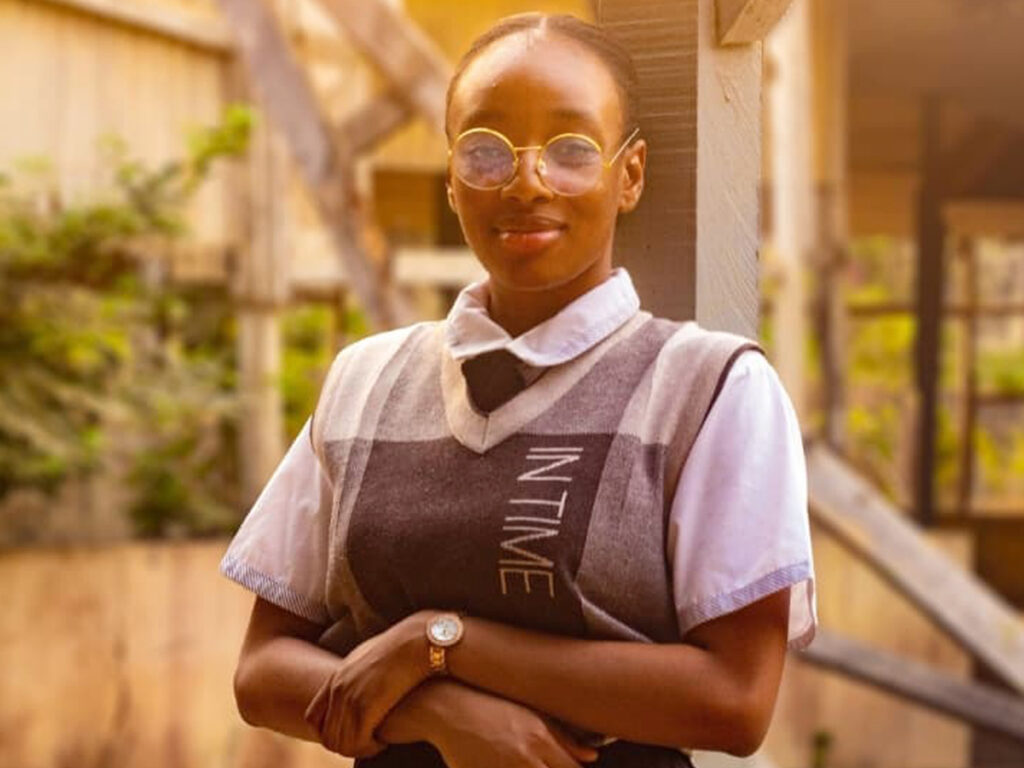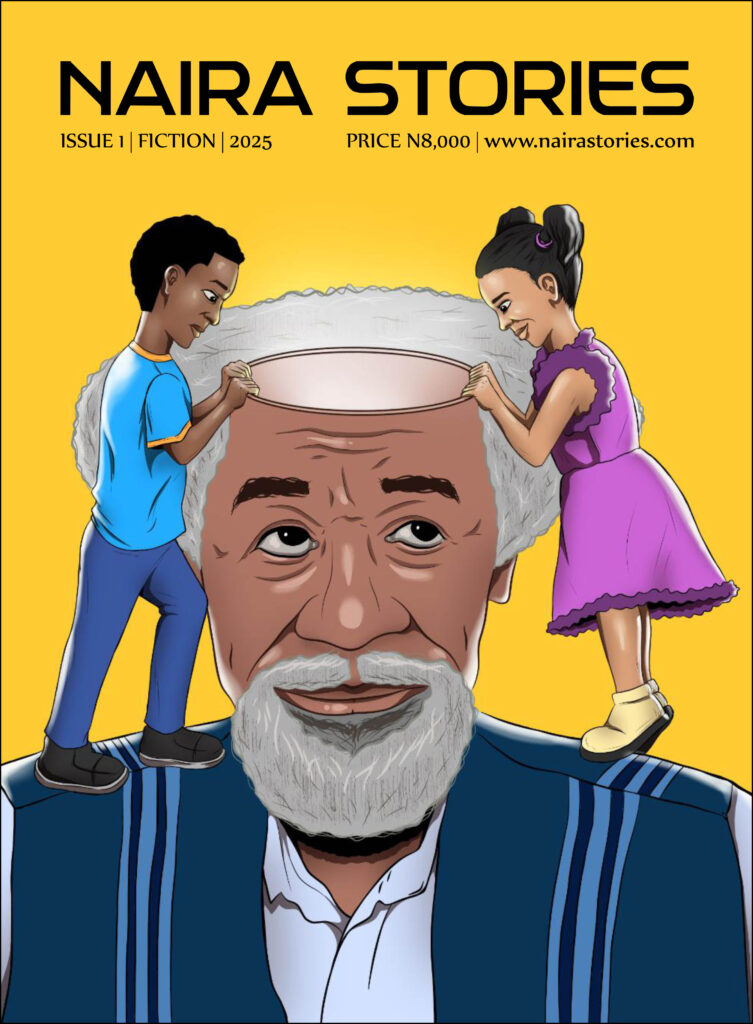Simisola Ajayi is an International Relations undergraduate student at Anchor University. She is the director for advocacy at Art in Heart Gallery, a campus ambassador of Cowrywise, and a United Nations High Commissioner for Refugees (UNHCR) Young Champion for Refugees. She is passionate about leadership, social change, and wants to be remembered as a changemaker, someone who helped people rise above the cages of incompetence and discover their true potential. In this interview with GRATEFUL OGUNJEBE, she speaks about her personal experience with forced displacement and migration, her humanitarian work, and the impact she is making in society.
Tell us about your engagement with Art in Heart Gallery. When and how did you land the job, and what is your role in it?
My engagement with Art in Heart Gallery is advocacy-driven. I officially joined the organisation on July 29, and I currently serve as the director for advocacy in addition to being a campus ambassador. The story of how I landed the role is quite interesting. I had actually submitted my CV a long time ago but never checked back. When I eventually did, I realised that I had been sent a message to schedule a call. I quickly reached out to confirm if the opportunity was still open, and thankfully, it was.
We had a brief interview, and while I initially applied for the campus ambassador position, I was offered an additional responsibility as director for advocacy. It was both surprising and humbling because it reflected the confidence the team had in my ability to push the Gallery’s vision beyond the campus space. In this role, I focus on raising awareness, mobilising young people, and ensuring that the Gallery’s mission of merging art, culture, and social consciousness is effectively communicated to wider audiences.
Art in Heart Gallery works at the intersection of art, technology, and spirituality. How do you translate these ideas into real impact for the communities you serve?
I only recently joined Art in Heart Gallery, so I am still undergoing training and orientation. However, one of the initiatives we are currently working on is focused on campus engagement. The idea is to create platforms where young people can showcase not only their artistic talents, but also their technological innovations.
Through this, we aim to nurture creativity in a way that contributes to sustainable development. For example, a student’s artwork or innovation can become more than just personal expression — it can be developed into ideas and solutions that bring real impact to communities. My role as director for advocacy places me at the forefront of raising awareness, mobilising youth, and ensuring that these creative outputs are recognised, celebrated, and channelled towards meaningful societal transformation.
As a young undergraduate, you are engaged in many extracurricular activities that span leadership, business, and social initiatives. What inspired your love for these endeavours? How do you create time, given your busy academic activities, to engage in these extracurricular endeavours?
People often say multitasking is impossible, but I have always been drawn to attempting what others call impossible. Growing up, I was surrounded by people who constantly juggled different responsibilities, and I believe that environment and association shaped me into someone who enjoys engaging in diverse pursuits.
Of course, it can be very challenging. However, I find that I can only multitask with things I genuinely love doing. That is why leadership, business, and social initiatives come naturally to me. I see them not as extra burdens but as passions that complement my academic journey.
Balancing them with academics is not easy, and I would not pretend otherwise. I rely heavily on structured planning, usually placing my activities on a scale of preference so that I do not end up doing the right things at the wrong time. At the same time, I allow some flexibility, because not everything in life can remain constant.
Above all, I draw strength from God. Juggling all these activities can be draining, so I constantly ask Him for guidance — what to prioritise, when to take a break, and even what to cut off if necessary. That reliance has helped me maintain balance, ensuring I give my best to both my academics and my extracurricular engagements without losing myself in the process.
Your profile states that you have an engagement with the investment firm, Cowrywise. Tell us about it and how it is shaping your work. How do you leverage the engagement to impact your community?
My engagement with Cowrywise actually began in a very personal way. I started simply as a saver. I have always loved saving money, so Cowrywise became a dependable platform for me to structure that habit. Over time, it went beyond savings and helped me better understand investments, especially through features like dollar funds. I often use that as a leverage point because when the dollar is converted to naira, the value increases. Investing this way has allowed me to grow my money more strategically.
As I learned more, I naturally began sharing these lessons with people around me. Friends who wanted to start saving would often come to me for advice, and I would recommend Cowrywise as a reliable platform. Beyond just recommending it, I have also helped some of them take their first steps in investing, guiding them on how to make their money work for them instead of just sitting idle.
This engagement has shaped my work by strengthening my financial literacy and giving me the confidence to talk about financial independence with others. At the community level, it has enabled me to spread awareness that savings and investments are not just for the elite — they are tools that every young person can use to build stability and long-term wealth.
You also serve as a United Nations High Commissioner for Refugees (UNHCR) Young Champion for Refugees. What inspired you to join the organisation, and what have you learned about leadership from working with displaced communities?
My journey with UNHCR started through a friend who invited me to join her in forming a team. UNHCR required that under the Young Champions for Refugees programme, participants work as a team. So, we pulled people together. At first, we had about sixteen members, but along the way. Some dropped out until we became nine. It was not an easy start, but I saw it as a unique opportunity to step into the United Nations space, something I have always dreamed of as an international relations student, who aspires to work with the UN.
What struck me most during this engagement was how different leadership feels when working with vulnerable communities. Displaced people carry deep scars of betrayal and broken promises, so trust becomes a major issue. We had experiences where some IDP communities rejected our offer of sponsorships simply because they had been disappointed too many times in the past. It taught me that leadership here is not about grand speeches but about earning trust slowly, consistently, and sincerely.
I also observed the contrast between different groups: some unorganised communities were more concerned with receiving material things, while others were very protective and careful, only opening up when they saw that we were committed. These experiences taught me patience, empathy, and the weight of responsibility — because every action we took mattered. Leadership, I realised, is not just about mobilising people but about showing integrity and consistency until trust is built.
Nigeria battles with internally displaced persons and refugees, especially in the northern region. If you were to advise the government on how to better the lot of these refugees and resettle them back to their communities, how would you go about it?
From my experience and observation, many IDP camps in Nigeria, especially in the northern region, are poorly organised and lack essential equipment. The living conditions in some camps are extremely challenging, making daily life almost unbearable. A major concern is security. IDPs are constantly at risk because violent incidents occur frequently in these areas, and many camps have even been attacked in the past. This instability discourages the development of camps and makes resettlement efforts extremely difficult, even as the number of displaced people continues to rise.
If I were advising the government, my priority would be to address security issues in the communities where these IDPs originally come from. Without stability, resettlement is impossible. Secondly, I would recommend upgrading IDP camps to make them safer, more organised, and better equipped. Ideally, these camps should be established as conflict-free zones, giving displaced persons a secure environment where they can access basic necessities and rebuild their lives.
Once security is assured, resettlement programmes can be designed and implemented more effectively, allowing communities to regain trust in the process and encouraging IDPs to return safely.
What role should young Nigerians play in redefining the country’s future, and how can they start making a difference right now?
Young Nigerians have a critical role to play in redefining the country’s future, and it begins at the grassroots level. To make real change, we must first understand the root causes of the challenges our communities face rather than just addressing the symptoms. This involves analysing why issues happen, when they arise, and how they impact people directly.
Once we have this understanding, young people should take the initiative to propose and implement solutions. Whether it is through community projects, advocacy, or entrepreneurship, change must be driven from the bottom up rather than relying solely on government action.
Additionally, being informed about laws and one’s rights provides a significant advantage. When youths know their rights and responsibilities, they can hold leaders accountable, promote justice, and contribute to a society that values fairness and participation.
In essence, young Nigerians can start making a difference right now by combining awareness, initiative, and civic engagement to build stronger, more resilient communities.
Through your work and internship at Lagos Television, what lessons have you learned about using the media to drive community and social change?
During my internship at Lagos Television, I learned that the media is one of the strongest drivers of movements and social change. Given the large percentage of Nigerians with access to social platforms, the way issues are portrayed — word by word — can shape public perception and influence action.
Unfortunately, media coverage is often dominated by trivial matters rather than pressing societal challenges. However, when leveraged intentionally, it can be a powerful tool for creating awareness, mobilising communities, and driving resistance against injustices. For example, media campaigns led by youth can inform people about critical issues, encourage precautionary measures, and even inspire collective action to address societal problems.
This experience reinforced for me that media, when used responsibly, have the potential to transform communities and hold systems accountable.
If you were tasked with designing a community youth empowerment project, which project would you initiate and why? And what unique approach would you take to ensure lasting results and sustainability of the project?
If given the opportunity, I would initiate a youth-led project focused on internally displaced persons (IDPs), as I have a deep passion for migration issues and displacement, partly because I have personally experienced the challenges of being displaced and migrating to Lagos.
The project would focus on raising funds and mobilising resources to support IDP camps, ensuring that displaced persons have access to proper shelter, education, healthcare, and livelihood opportunities. Beyond immediate relief, I would also work on developing sustainable camp structures that prioritise safety, dignity, and long-term integration into society.
What makes my approach unique is the emphasis on empowering displaced persons themselves by involving them in decision-making, skill acquisition, and small-scale economic activities that foster self-reliance. By combining fundraising, youth mobilisation, and partnerships with organisations like UNHCR, the project would not only meet urgent needs but also build pathways for IDPs to rebuild their lives with dignity.
You said you have experienced the challenges of being displaced before migrating to Lagos. Tell us about this displacement — how, where, and when it happened. How did it shape your view of life?
In 2013, my family was caught in the Offa–Erinle crisis in Kwara State, a violent conflict that had been brewing for years over boundary disputes. That year, the violence reached its worst point. There were killings, destruction, and constant fear. My mother lost some of her colleagues, her office had to shut down, and death threats made it impossible for us to stay. We fled to Lagos to join my father, leaving behind not just our home, but also the life we knew.
As a child, this was difficult to understand. I remember the confusion of being forced to leave everything familiar behind, and the fear of not knowing what could happen next. But it was also the moment I first realised how deeply the past can affect the present. Old disputes had resurfaced, only this time with greater pain and loss.
That experience shaped how I see life. It made me value safety and stability in ways many take for granted. It also opened my eyes to the struggles of displaced people everywhere. I learned empathy at a very young age, and that empathy later fueled my work with UNHCR. For me, displacement stopped being just a word — it became a lived reality, and one that continues to guide my passion for migration and humanitarian issues today.
Looking back at your journey so far, which challenge tested your leadership skills the most, and what did it teach you about yourself and people?
Leadership has never been without its challenges, especially when I am tasked with leading group presentations and research projects. While it is difficult to single out one particular moment as the hardest, I have realised that leadership is truly tested when the dynamics within a team are not smooth.
One key lesson I learned is that trust is powerful. When people genuinely trust you, they are often calmer and more confident, even when things seem uncertain. At the same time, I have also seen the reality that not everyone will always align with your vision. Some may even want to prove superiority. This taught me the importance of patience, humility, and staying focused on the bigger goal.
I have also discovered that leadership can sometimes create blind spots — because when people submit to your authority, they may agree even when you are wrong. That insight has made me more deliberate about being a democratic leader: encouraging open dialogue, welcoming diverse opinions, and creating an environment where everyone feels heard, as long as their input aligns with the task at hand.
Ultimately, leadership has taught me that it is not about control, but about earning trust, managing differences, and guiding people toward a common purpose.
What is next for you after graduation? When people hear your name in five years, what impact or legacy do you hope they will associate with you?
I want to be remembered as a woman changemaker, someone who helped people rise above the cages of incompetence and discover their true potential. I want to empower others to become confident public speakers, because I believe that finding one’s voice is the first step to making change. I also want to dedicate myself to supporting displaced persons, ensuring they find not only safety but also dignity and opportunities to rebuild their lives.
Alongside this, I envision establishing my fashion brand and seeing it expand to at least five countries, carrying with it a message of creativity, identity, and excellence. For me, it is not enough to have a résumé filled with experiences; what matters most is impact. I want my legacy to be defined by the lives I touched and the global recognition of my work as a true changemaker.
How would you advise Nigerian undergraduates aspiring to achieve the kind of feat you have achieved? What three lessons have you learned in your work or studies that you would like them to learn from?
My advice is simple: Trust God, trust yourself, and take risks.
The world does not celebrate timidity; it rewards those who dare. But to truly dare, you need an external source of strength — and, for me, that source is God. Human support can fail, especially when the task is great, but God’s backing never fails. With Him, you can dream big and take bold steps with confidence.
The second lesson is believing in yourself and your capacity. Even when opportunities seem overwhelming, your confidence and preparation will carry you through.
Finally, take risks — not reckless ones, but intentional risks that move you closer to your goals. Every breakthrough I have had has come from daring to step out of my comfort zone. So for me, the formula is simple: God + You + Risk = Result. That is what I live by, and it has helped me achieve the milestones I have reached so far.




